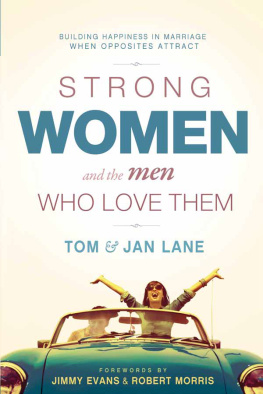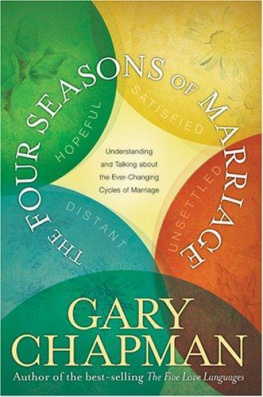

T HE FOLLOWING RESOURCES ARE RECOMMENDED to you to help address sexual issues in yourmarriage. They are biblically based books from respected authors who are recognizedexperts in this area of marriage development.
Gregoire, Sheila Wray. The Good Girls Guide to Great Sex. Grand Rapids, MI: Zondervan,2012.
Langberg, Diane. On the Threshold of Hope: Opening the Door to Healing for Survivorsof Sexual Abuse. Forest, VA: American Association of Christian Counselors, 1999.
Lasser, Mark. Healing the Wounds of Sexual Addiction. Grand Rapids, MI: Zondervan,2004.
Parrott, Les. Crazy Good Sex. Grand Rapids, MI: Zondervan, 2011.
Penner, Clifford L. and Joyce J. Penner. Getting Your Sex Life Off to a Great Start.Nashville: Thomas Nelson, 1994.
. Sex Facts for the Family. Nashville: W Publishing Group, 1992.
. The Gift of Sex. Nashville: W Publishing Group, 2003.
. The Way to Love Your Wife. Carol Stream, IL: Focus on the Family, 2007.
Rosenau, Douglas E. A Celebration of Sex. Nashville: Thomas Nelson, 2002.
Rosenau, Douglas E. and Jim and Carolyn Childerston. A Celebration of Sex After 50.Nashville: Thomas Nelson, 2004.
Tracy, Steven. Mending the Soul. Grand Rapids, MI: Zondervan, 2005.
Tracy, Steven and Celestia. Mending the Soul Workbook for Men and Women. N.p.: n.d.
CHAPTER 1
UNCOVERING THE PASSIVE MAN
Scott Wetzler, Living With the Passive-Aggressive Man (New York: Fireside, 1992),14.
Ibid., 16.
(accessed October 6, 2014).
CHAPTER 3
THE THIEF THAT DESTROYS
Pat Springle, Codependency (Houston: Rapha Publishing, 1990).
Margaret Rinck, Can Christians Love Too Much? (Grand Rapids, MI: Zondervan, 1990).
CHAPTER 11
FINDING RESOLUTION
John M. Gottman and Nan Silver, The Seven Principles for Making Marriage Work(New York: Three Rivers Press, 1999), 23.
John Gottman, Why Marriages Succeed or Fail (New York: Simon & Schuster, 1994),28.
Ibid.
Howard J. Markman, Scott M. Stanley, and Susan L. Blumberg, Fighting for YourMarriage: Positive Steps for Preventing Divorce and Preserving a Lasting Love (SanFrancisco: Jossey-Bass, 2001), 37.
CHAPTER 13
WHERE TO FROM HERE?
(accessedOctober 19, 2014); Agnes Jensen Mangerich, Albanian Escape: The True Story of U.S.Army Nurses Behind Enemy Lines (Lexington, KY: The University Press of Kentucky,1999).

I T WAS MY NINTH-GRADE YEAR AND I WAS BARELY in my teens. I was assigned a seat instudy hall next to a cute girl named Jan Frazier. She was full of life and so muchfun. She was vocal, outgoing, and friends with everyone. This combination of her outgoing personality and the way she expressed herself gother in trouble regularly with our study hall teacher. Her constant socializing andher spunky attitude toward his oversight was more than he could handle some days.I think Jan spent more time in a chair facing a corner of the room than she did sittingnext to me in productive study. In almost every one of her responses to life, shewas different from me. She was an enigma to meso fun, vibrant, and attractive, butalso borderline disrespectful with her attitude and opinions. My perspective of Janssituation was that she needed a better way of relating to authority.
Our study hall friendship eventually developed into a dating relationship and laterinto a marriage commitment. As our marriage progressed, I made an internal decisionto take Jans quirkiness on as my personal improvement project. I wanted to harnessthe life and energy she demonstrated into a more productive expression toward ourfriends, the authority figures in her life, and in her expressions toward me. Ifelt I could help her temper the strength of her responses and turn them into expressionsthat were more winsome and easier to receive.
The friction I felt between us was the strength of Jans extroverted personalityversus my relational diplomacy and tact. The stage was set for a wrestling matchof perspectives, with marital harmony and purpose as the grand prize. But I had noidea all that would be involved in this match of personality, perspective, and power.I thought this would be a quick, easy fix on our way to marital blissyet on my wayto fixing Jan, I uncovered issues about myself. At times it was difficult to tellif I was wrestling with Jan or the personal issues in my own life that impacted ourrelationship. Whats more, it felt as if I was losing the wrestling match. It washard to believe that the reason I was losingand that the reason a quick victoryhad eluded memight be more related to me and my issues than hers!
It took me much longer than it should have to recognize and acknowledge that mykind and diplomatic style of relating had a dark, unhealthy side. While it had theeffect of making people feel good and often helped to defuse or avoid conflict, itproduced dishonesty and ultimately allowed barriers of disconnection to be erectedin my relationship with Jan. That is where my side of our story begins. It was notan easy process for me to uncover and accept the passive-aggressive underbelly ofmy "diplomatic," people-pleasing style of relating, but such discovery and self-examinationwas required for the health of our marriage.
WHAT IS PASSIVITY, REALLY?
Is the term passive-aggressive offensive to you? It is to me. I resisted identifyingmyself as passive-aggressive, and I denied, argued, and contended just short of fightingwith any attempt by others to put that label on me. I associated passivity with negativeterms like wimp, loser, sissy, and mommys boy, and I wanted nothing to do with thosedescriptions. As I saw it, being passive meant being nonaggressive, weak, and withoutdirection in life. I thought that passive people are the ones who are told whatto do and how to think. As Scott Wetzler says in his book Living With the Passive-AggressiveMan:
The term passive aggressive was first coined during World War II by an Army psychiatrist,Colonel William Menninger, who had been trained to deal with strong negative reactionsto military life. Menninger recognized that the military is structured for uniformityand compliance, where individual choice, opinion or expertise does not change therules, where you are obliged to suspend the determination of your own destiny. Henoticed that while [some] men thrived under this rigorous institutional structure,others perished and protested.... To deal with enforced change and cope with thelack of opportunity for personal choice, these soldiers resisted, ignored orders,withdrew or simply wanted to flee. Menninger labeled this resistance passive-aggressionand described it as an immaturity reaction.
Passive-aggression is not a reflection of personality as much as it is a reactionto circumstances a person is experiencing. This tendency can be influenced by personalitytype, but even more it can be developed as a method of reacting to circumstancesthat make an individual feel overwhelmed and out of control with little or no optionto determine the outcome. If a man concludes that his position is weak, threatened,or powerless to influence or change the circumstances around him and he acts withhidden, subtle resistance, his behavior is passive-aggressive. This response is developedas a pattern toward dominating authority and is often a reflection of performancethinking and the fear of failure or rejection.
Next page











